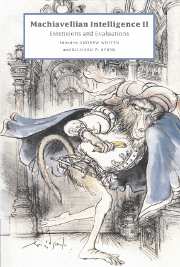Book contents
- Frontmatter
- Contents
- Contributors
- Preface
- 1 Machiavellian intelligence
- 2 Friendships, alliances, reciprocity and repair
- 3 Why Machiavellian intelligence may not be Machiavellian
- 4 Social intelligence and success: Don't be too clever in order to be smart
- 5 Minding the behaviour of deception
- 6 The Machiavellian mindreader
- 7 Exploiting the expertise of others
- 8 Primates' knowledge of their natural habitat: As indicated in foraging
- 9 Evolution of the social brain
- 10 The modulatory of social intelligence
- 11 The Technical Intelligence hypothesis: An additional evolutionary stimulus to intelligence?
- 12 Protean primates: The evolution of adaptive unpredictability in competition and courtship
- 13 Egalitarian behaviour and the evolution of political intelligence
- 14 Social intelligence and language: Another Rubicon
- Index
13 - Egalitarian behaviour and the evolution of political intelligence
Published online by Cambridge University Press: 23 November 2009
- Frontmatter
- Contents
- Contributors
- Preface
- 1 Machiavellian intelligence
- 2 Friendships, alliances, reciprocity and repair
- 3 Why Machiavellian intelligence may not be Machiavellian
- 4 Social intelligence and success: Don't be too clever in order to be smart
- 5 Minding the behaviour of deception
- 6 The Machiavellian mindreader
- 7 Exploiting the expertise of others
- 8 Primates' knowledge of their natural habitat: As indicated in foraging
- 9 Evolution of the social brain
- 10 The modulatory of social intelligence
- 11 The Technical Intelligence hypothesis: An additional evolutionary stimulus to intelligence?
- 12 Protean primates: The evolution of adaptive unpredictability in competition and courtship
- 13 Egalitarian behaviour and the evolution of political intelligence
- 14 Social intelligence and language: Another Rubicon
- Index
Summary
The puzzle of egalitarian society
The common ancestor of humans and the African great apes was a nonmonogamous ape, one that lived in a closed social network and exhibited hostile relations between groups with stalking and killing of conspecifics by males. Wrangham (1987) deduced these ancient traits conservatively by tallying behaviours that humans share with all three African apes. However, the presence or absence of social dominance hierarchy was left in abeyance — even though hierarchies are all too apparent in chimpanzees, gorillas, bonobos, and Neolithic and modern humans. The problem, presumably, was that human foragers, being egalitarian, have been taken to exist without any significant hierarchy; this erroneous assumption has seriously confused the assessment of our own political nature.
More recently, Knauft (1991) has likened our political evolution to a ‘U-shaped curve’. He does assume our common ancestor lived hierarchically, but points out that this approach to social life disappeared for a long span of evolutionary time until it returned with chiefdoms, civilisation and modern nations. Focusing on the ‘simple-foragers’ in whose bands evolved the genes we now carry, Knauft characterises them as largely lacking hierarchy in the form of dominance relations or stratification among the males, and as exhibiting little or no leadership and very low levels of inter-group violence.
Recent work of my own (Boehm, 1993) has questioned the first of these assumptions. I have suggested that among foragers hierarchical behaviour did not actually disappear but rather it assumed a radically different form.
- Type
- Chapter
- Information
- Machiavellian Intelligence IIExtensions and Evaluations, pp. 341 - 364Publisher: Cambridge University PressPrint publication year: 1997
- 14
- Cited by



